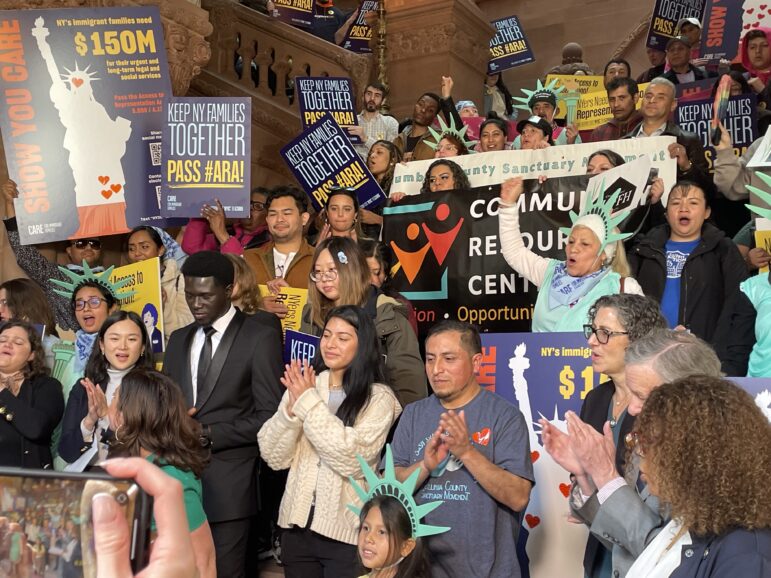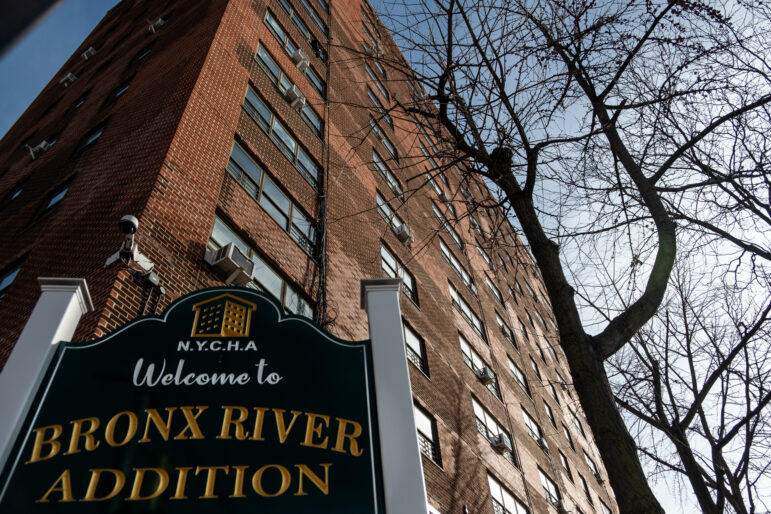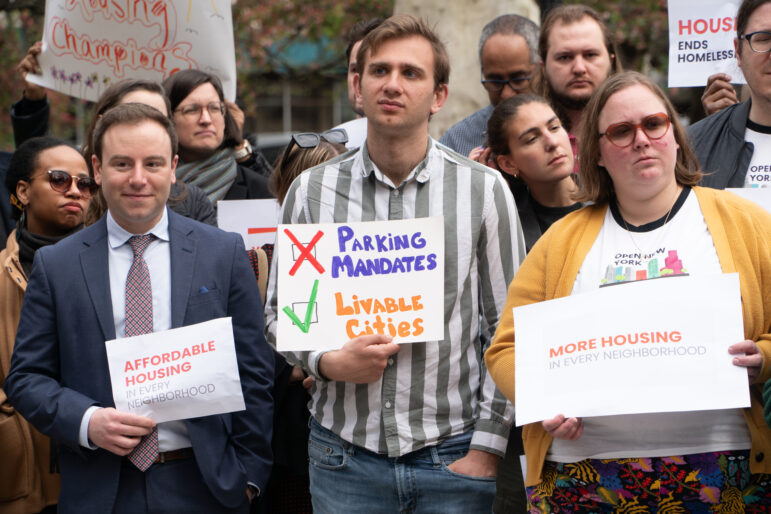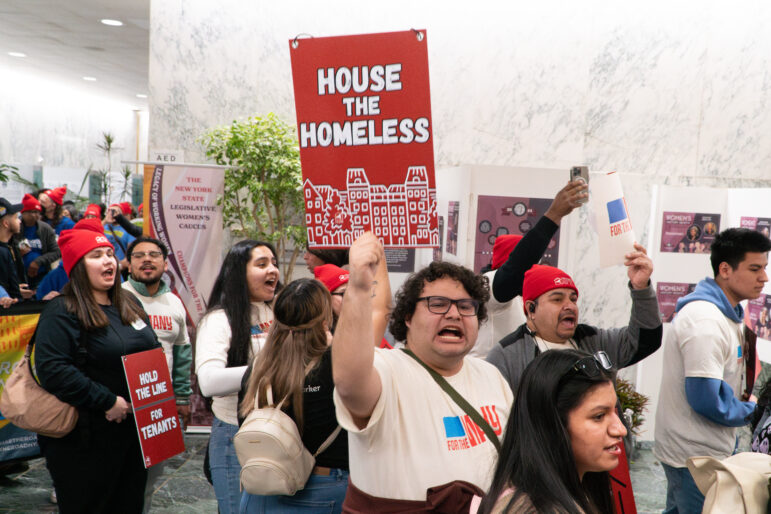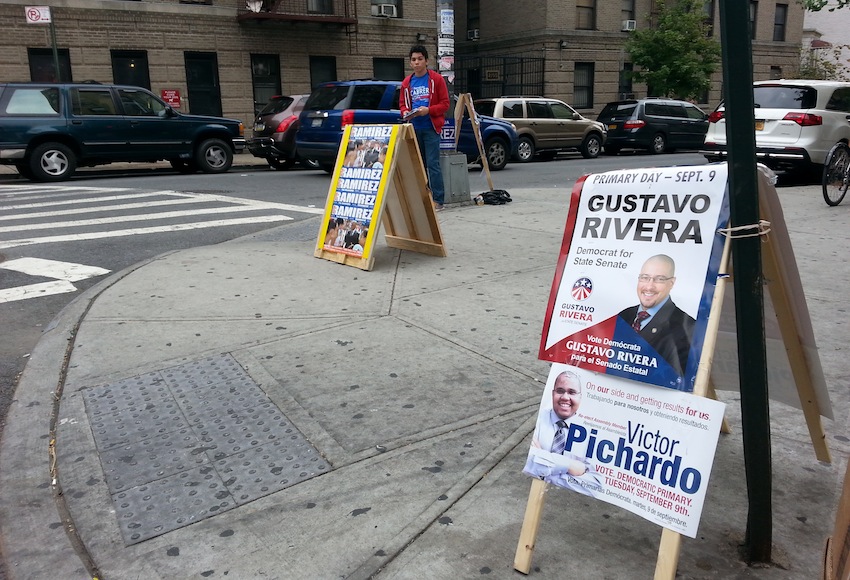
Jarrett Murphy
Campaign workers and signage outside IS 117 on Morris Avenue on Primary Day.
Thomas Patterson believes many things, and he believes them strongly. He believes fracking is a terrible idea. He believes that unions—like his, the Carpenters’—are the only way to reverse years of Reaganomics that have devastated the middle class. He once believed so strongly that public officials were ignoring the impact of crack on his home neighborhood, Harlem, that he busted up Congressman Charles Rangel’s office with a baseball bat to get their attention; he points to heaven and swears an oath that this is true.
Patterson, now living in Morrisania, also believes in State Sen. Jeff Klein. “There’s only one politician in the state who’s getting it done,” he said Tuesday night after a day of making phone calls to voters from Klein headquarters, “and it’s this guy.”
Voters in the 34th senatorial district, which stretches from Riverdale down to Soundview, around the east coast of the Bronx and up into Westchester County, agreed with that sentiment yesterday, returning Klein to Albany by a 67-to-33 percent margin over former Councilman Oliver Koppell.
It was a good night for incumbents in the Bronx. Sen. Ruth Hassell-Thompson, widely expected to vacate her post to become mayor of Mount Vernon next year, easily beat Crystal Collins to retain the Democratic nomination for her seat, which covers parts of the Bronx and Westchester. Like most winners on primary night, she will face general election opposition in November from Republican or third-party candidates.
Despite a forceful presence of poll-workers throughout the central Bronx’s 33rd district, Councilman Fernando Cabrera failed to unseat Sen. Gustavo Rivera. Cabrera, greeting voters at dinner time on Jerome Avenue, said the reports last week about his comments in support of anti-gay policies in Uganda had never come up in talking with people in the district. “That was all Crain’s, New York Observer. My people don’t read that stuff.” The reality, he says, is that “people are hurting here.” He predicted the evening would end in a mandate; if so, it was Rivera’s to claim.
Assemblymembers Marcos Crespo and Jose Rivera also survived challenges.
Victor Pichardo, who won the 86th district Assembly seat in a crowded special election last year by a 72-vote margin over Hector Ramirez, was trailing Ramirez by 11 votes out of some 3,500 cast in their rematch, with all but one election district reporting, according to NY1.
Their 2013 race was marred by problems with voting machines that Pichardo’s rivals believe favored him. Ramirez last week called for federal monitors in this year’s race. Pichardo seconded that call. In a statement released early this morning, Pichardo said he was “confident that my neighbors have again chosen me as their representative to the Assembly.”
“While the election, at the moment, is too close to call, I am optimistic that I will be declared the winner of this race and that the Board of Election will work diligently to sort through all the dirty tactics my opponent deployed to intimidate voters on Election Day to accurately determine who the voters have chosen to represent them,” he added. The alleged tactics included people accompanying people to the privacy booth to direct their vote.
Ramirez, in a statement, said, “While still a small margin, we are optimistic that once all the votes are counted, we will be victorious.
Michael Blake’s well-funded effort outdistanced that of the Bronx Democratic organization pick, Marsha Michael, in a six-way race to fill the seat vacated by the convicted Eric Stevenson in the 79th district. Latoya Joyner prevailed easily over a field of four to take the 77th district race; that seat was vacated when Vanessa Gibson ascended to the City Council.
Klein’s victory party at a restaurant in Morris Park revolved around Patterson’s theme of getting things done. “People like Gov. Andrew Cuomo and State Sen. Jeff Klein made the state work again,” shouted Assemblyman Michael Benedetto, noting the senator’s role in securing marriage equality. Councilman Ritchie Torres pointed to Klein’s part in funding Mayor de Blasio’s UPK initiative and getting expanded rent exemptions for senior citizens, calling Klein “the gold standard for public service.”
“We kept our principles intact and made government work for you and you and you,” Klein told the joyous crowd. Referring to his decision to form a caucus that ultimately broke away from Senate Democrats and allied with Republicans, Klein said: “Four years ago I did something bold with a group of other Democrats,” noting that what seems bold at first eventually “is considered par for the course.” Klein has pledged to bring the Independent Democratic Caucus back to the Democratic side in the new legislative session.
He led the revolt, he said, because “The voters of New York wanted more. The people wanted a government that stayed true to Democratic values but made government work for them.” The crowd erupted into cheers of “IDC! IDC!” and Klein joined them.
Klein highlighted his work on the SAFE Act, a minimum wage hike and the pre-K funding, and pledged to now work to pass the DREAM Act and more secure state protection for reproductive rights—two legislative goals that his former allies, the Senate GOP, resisted. His victory ended a roller-coaster ride to re-election that began with the Working Families Party and other progressive powerhouses threatening to ditch Klein for Koppell to punish the IDC for its alliance with the Republicans. It ended with those forces largely lining up behind Klein, who also enjoyed an enormous financial advantage.
As the TV screens near the stage showed primary night winding down, Klein said that a campaign’s end sometimes brings validation. “And I think,” he told the room, “you all can feel validated.”


